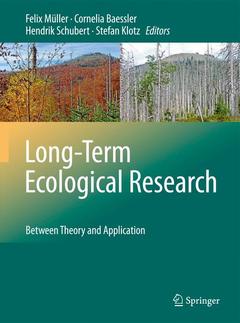Description
Long-Term Ecological Research, 2010
Between Theory and Application
Coordinators: Müller Felix, Baessler Cornelia, Schubert Hendrik, Klotz Stefan
Language: English
Subjects for Long-Term Ecological Research:
Publication date: 11-2014
456 p. · 19.3x26 cm · Paperback
Publication date: 07-2010
456 p. · 19.3x26 cm · Hardback
Description
/li>Contents
/li>Comment
/li>
Ecosystems change on a multitude of spatial and temporal scales. While analyses of ecosystem dynamics in short timespans have received much attention, the impacts of changes in the long term have, to a great extent, been neglected, provoking a lack of information and methodological know-how in this area.
This book fills this gap by focusing on studies dealing with the investigation of complex, long-term ecological processes with regard to global change, the development of early warning systems, and the acquisition of a scientific basis for strategic conservation management and the sustainable use of ecosystems.
Within this book, theoretical ecological questions of long-term processes, as well as an international dimension of long-term monitoring, observations and research are brought together. The outcome is an overview on different aspects of long-term ecological research. Aquatic, as well as terrestrial ecosystems are represented.




